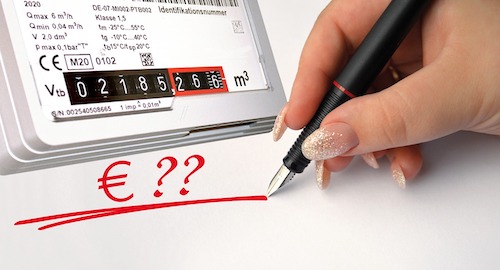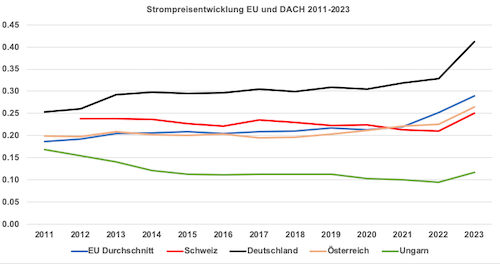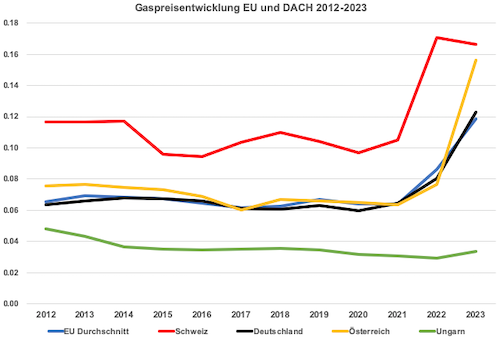FAQ RSS
This is my personal blog where I answer frequently asked questions about Hungary, emigrating to Hungary, buying a house in Hungary and living in Hungary. You can follow my blog using the RSS button if you have an RSS feed reader installed. There are various free readers you can easily install as a plug-in.
What are the additional costs for a house in Hungary?

In connection with emigrating to Hungary and the idea of buying a house in Hungary, the question of operating expenses inevitably arises.
Good news! The additional costs for a house in Hungary are a fraction of what they are in German-speaking countries (DACH).
For the essential costs of electricity and gas, the prices are about a third or less. Firewood costs about 50-80%.
For water and wastewater, the costs are difficult to compare due to very specific municipal prices in the individual countries, but they are about half the price.
Comparing household waste disposal is equally difficult. 10-50% of the costs of the DACH countries are incurred in Hungary, depending on the individual comparison communities.
| Utility Type | Cost Factor (vs. W. Europe / DACH) |
|---|---|
| Electricity | approx. 30% |
| Gas | approx. 30% |
| Firewood | 50 - 80% |
| Water / Sewage | under 50% |
| Waste Disposal | 10 - 50% |
The detailed presentation of the individual types of additional costs illustrates, on the one hand, the different price structures and, on the other hand, the development of prices in recent years. While the Hungarian state keeps the additional costs largely stable through subsidies, they have risen significantly in the DACH countries.
Hungary is one of the countries with the lowest additional costs within the EU.
By the way, if you buy real estate in Hungary through us, Ungarn-Immobilien will of course help you free of charge with the re-registration of all suppliers as well as registrations and administrative processes for a new start in Hungary. So you can enjoy your new life without any worries.
So let’s delve into the intricacies of Hungarian utilities, with a particular focus on electricity, gas, water, sewage and wood.
Electricity costs
Electricity costs are often the largest item of utility costs in Hungary.
According to the Hungarian Central Statistical Office, the average consumption of a Hungarian household in 2022 is 185 kW per month. Eon, the previous supplier, set the annual average consumption at 2523 kWh / year for 2024, so slightly higher. Up to this level of consumption, electricity prices are capped by the state. In 2024 MVM, the state owned company, took over the electricity supply from Eon.
The following tariffs/prices apply to private end consumers (January 2024):
A1 and A2 prices are the normal tariffs for private consumers.
| Tariff | Condition / Period | Price (HUF/kWh) |
|---|---|---|
| A1 (Standard) |
Usage up to 2,523 kWh / year | 35.293 |
| Usage above 2,523 kWh / year | 70.104 | |
| A2 (Time-of-Use) |
Peak (Mon-Fri 07:00–23:00) | 43.409 |
| Off-Peak (Night & Weekend) | 32.766 | |
| Over 2,523 kWh total usage (Flat rate) | 70.104 | |
| H (Heat Pump) |
Heating Season (Oct 15 – Apr 15) (unlimited) | 23.520 |
| Off-Season (up to 2,523 kWh) | 35.293 | |
| Off-Season (above 2,523 kWh) | 70.104 | |
| B (Night/Wired) |
Usage up to 2,523 kWh / year | 23.520 |
| Usage above 2,523 kWh / year | 60.935 | |
| System Fees |
Electricity Supply (per kWh) | 17.272 |
| Transmission Fee (per kWh) | 12.446 | |
| Base Fee (per year) | 1,836.42 |
In principle, electricity prices apply nationwide. There are slight variations in prices in a few areas where sub-companies of MVM has slightly different pricing. There, the subsidized price can range from HUF 35,293 to HUF 43,409.
For my personal electricity bill I paid 553,114 HUF all inclusive for 9,120 kWh in 2023, i.e. around 60.65 HUF /kWh, which is around 15 centimes or 16 euro cents per kWh at an exchange rate of January 2024.
This means that electricity costs in Hungary are a third or less, depending on the amount consumed.
If you compare the development of electricity prices over the last 10 years in Germany, Austria, Switzerland and Hungary, it quickly becomes apparent that electricity prices in Hungary are only a fraction and that the increase has remained rather moderate in comparison to date. The construction and operation of the new Paks II nuclear power plant will support the Hungarian government's energy policy in the medium term.

Source: Eurostat
Basically, consumption habits are very individual, so the examples here can only give a first impression.
Tip 1: When buying a house in Hungary, pay attention to wall thickness, insulation, type of glazing and possibly an existing solar system, separate meters for heating with electricity or heat pumps.
Solar systems as an alternative or support
Solar systems are often supported in Hungary with various funding programs. Sometimes the funding only applies to certain target groups such as families with children or certain villages that are eligible for funding. At the time of writing, a new funding program was launched with a 66% subsidy for new systems with an output of 4-5 kW and storage units of 7.5-10 kW for everyone with a Hungarian tax number and up to a maximum of HUF 5 million.
It was not yet clear whether there was a feed-in tariff/offset. A number of applications from building contractor colleagues had been on hold for months at the time of writing.
Even with the funding mentioned, assuming feed-in billing, the payback period in my case was over 12 years. Without it, it would have been closer to 16 years, so I decided against it.
Eon used to offer a German version on the Hungarian website and also German and English-speaking customer service. MVM has dropped the German service, but there is an English speaking service, if you press '5' after calling one of the service numbers.
MVM Service numbers
- 06 20 474-9999
- 06 30 474-9999
- 06 70 474-9999
- 06 1 474-9999
Gas costs in Hungary
Gas heaters are widespread in Hungary. 79% of Hungarian households have a gas connection. 60% of households with a gas connection heat with natural gas. According to the Hungarian Central Statistical Office, the average consumption of a Hungarian household in 2022 is 94m3 per year. This makes the cost of gas the second largest item of additional costs in Hungary.
Hungary's annual natural gas consumption amounts to more than 14 billion cubic meters, which represents 70% of total energy consumption. 45% of the amount consumed is for residential use. Hungary imports natural gas via Ukraine and Austria. Russian natural gas comes to Hungary from the east and accounts for about 70% of imported natural gas.
The relevant tariff for households when it comes to gas prices is A1. Municipal gas is usually sold by MVM . The current gas prices from MVM from October 2023 are shown here. There may be marginal differences depending on the region or sales company.
The gas bill shows the consumption in megajoules (MJ) and the total consumption also in cubic meters (m3).
Community gas
- Up to 63,645 MJ(approx. 1729 m3) / year 2.9 HUF/MJ or 99.9 HUF/m3 (0.24 CHF/0.25 EUR per m3)
- From 63,645 MJ (approx. 1729 m3) 22,002 HUF/MJ or 767.2 HUF/m3 (1.86 CHF/1.95 EUR per m3)
If you compare the development of gas prices over the last 10 years in Germany, Austria, Switzerland and Hungary, you can also see that gas prices in Hungary are only around a third or less. Thanks to long-term gas contracts with Russia, the gas price has been kept stable in recent years.

Source: Eurostat
In Hungary it is also common practice, especially in remote areas, to store and use liquid gas in your own tanks at home. It is possible to rent gas tanks. The calorific value of liquid gas is a good 4 times as high as natural gas. While natural gas has around 34 MJ/m3, liquid gas has 109MJ/m3 or correspondingly 9.4 kWh/m3 versus 30.3 kWh/m3.
Tip: Choosing well-insulated homes and exploring alternative heating sources such as wood stoves, heat pumps or solar-assisted heaters can significantly reduce your gas costs.
Firewood costs in Hungary
Wood is widely used as fuel in Hungary, be it in wood-burning heaters, (water-powered) tiled stoves, iron stoves or simply in fireplaces.
Heating with pellets is less common, certainly due to the prices. Pellet prices are subject to strong fluctuations over time. At the time the article was written, pellet prices were between 350 and 440 EUR/t, depending on quality, while at the same time prices in Germany were below 300 EUR/t.
In Hungary, however, people heat less with pellets and more with firewood. Depending on the provider, type of wood and quality, the price is between 60 and 100 EUR per cubic meter or, if you have good neighbors, it can be a little cheaper.
This means that the cost of firewood in Hungary is around a third to half lower than in Germany and Austria, where prices as of February 2024 were around EUR 120 per cubic meter.
Water and wastewater prices in Hungary
Here it becomes even more difficult to compare individual countries due to the lack of standardized data and a very heterogeneous price structure in all countries. Each collection point uses slightly different definitions and the drinking water and wastewater prices also vary greatly within the countries depending on the canton, federal state or municipality.
In Germany, the average drinking water price rose by almost 20% from 2014 to 2022, from EUR 1.92 to EUR 2.28 per cubic meter, although there can be a wide range of up to EUR 1 difference depending on the state. The price of drinking water in Austria is currently somewhat more moderate at EUR 1.83 per cubic meter. In Switzerland, the average per cubic meter for a three-person household is EUR 1.85, with strong fluctuations depending on the municipality.
While heating and electricity costs make up the majority of additional costs in Hungary, water and wastewater costs are negligible. Like all other additional costs in Hungary, the costs for drinking water are significantly lower compared to the DACH countries.
The state also subsidizes water costs. In 2012 the government froze water costs and in 2013 they even reduced them again by 10%. Water and wastewater fees in 2020 were only 54.1% of the real costs. In contrast to electricity and gas prices, the price for drinking water and wastewater also varies depending on the region in Hungary.
While in 2024 the cubic meter of drinking water in Györ will cost 173.4 HUF (around EUR 0.45), in Budapest it will be 218.9 HUF (around EUR 0.56) and in Balatonkens it will be 453.7 HUF (1.16 EUR).
In the municipality where my house is located, the water price is currently 341.76 HUF/m3, waste water is also 341.76 HUF/m3 plus a 228.6 HUF connection fee per month, which brings me to the proud price of 4,962 HUF per month including VAT (equal to CHF 12 or EUR 12.70).
Tip: If you don't have your own well and the garden is watered via the house water connection, you can install separate water meters to further reduce the water costs for this area.
There are discussions in Hungarian politics to harmonize the price of water in Hungary, taking into account special industrial requirements of certain municipalities that host companies with high water demands, such as battery factories.
A similar picture emerges for the prices of wastewater in Hungary.
In Germany, the price of wastewater including rainwater fees rose by around 5% from 2014 to 2022, from EUR 2.27 to EUR 2.38 / m3. In Austria, the price for wastewater in 2023 was an impressive 4.52 /m3. In Switzerland, the average price for a 3-person household is given by the price monitor as EUR 2.07.
In summary, it can be said that the water costs less than 50% compared to DACH.
Waste disposal in Hungary
The costs of waste disposal in Hungary, like water and wastewater costs in some countries, vary greatly depending on the municipality and provider. The comparison is even more difficult because prices can fluctuate extremely depending on the waste concept, size of the waste container and region. For example, in Germany, the weekly emptying of a 240 liter ton of residual waste costs EUR 386 per year in Hamburg and EUR 1,333 in Bochum.
In Austria, for example, the weekly emptying of a 240l bin costs EUR 545 per year in Vienna or EUR 93 in St. Veit.
The average price of waste disposal in Switzerland for an average 3-person household is around EUR 2.15 per 35 liter bag. The concept in Switzerland is that the bags are purchased separately and the bags are made available for collection as needed, so there are not necessarily weekly costs regardless of the filling quantity.
The costs for waste disposal in Hungary also vary from region to region.
In the Debrecen region, for example, prices for a 240l ton are between 517 and 796.50 HUF per collection, which amounts to an annual fee of 65-101 CHF or 69-106 EUR.
In my community, a 120l bin costs 433 HUF including VAT per collection. That's 22,516 HUF (55 CHF/ 58 EUR) per year.
This means that, despite the strong fluctuations depending on the municipality, waste disposal is only a fraction of the costs in the DACH countries, even if a direct comparison is almost impossible and only examples can be given here to illustrate this.
Depending on the region, there is also a different concept for waste separation. In some communities there are central containers for glass, cardboard and residual waste. In some communities you can order separate bins for your own home.
In my community, the central containers were abolished again because the separation was not clean. To do this, everyone can order separate bins from the waste disposal company for a fee, which means that the majority of the waste is no longer separated and simply ends up in the household waste.
Hungary has introduced a deposit system for plastic bottles in 2024. Most of the plastic bottles have a tiny deposit which you can recover at self-service stations in supermarkets.
As you can see, utility costs in Hungary vary depending on several factors. However, compared to many Western European countries, Hungary offers a relatively affordable living environment. Remember that conscious consumption behavior and strategic decisions when choosing your home in Hungary can significantly influence your utility bill.
Whether you imagine yourself in a charming apartment in Héviz or a house on Lake Balaton with a roaring fireplace, Hungary offers a unique blend of affordability and charm. Operating expenses are not the only reason to move to Hungary, there are many more. Are you ready to make the Hungarian dream come true? Find your perfect Hungarian retreat.
Navigating the Hungarian real estate market can be daunting, especially because of the language barriers and unfamiliar processes. There are also some less reputable sellers and brokers on the market. This is where Ungarn-Immobilien comes into play.
We are a German and Englsih speaking real estate agent. Our experienced colleagues and partners speak several languages and have extensive knowledge of the Hungarian real estate market.
We'll be with you every step of the way, from understanding local regulations to finding the ideal property that fits your budget and lifestyle. With Ungarn-Immobilien, finding your dream Hungarian property becomes a seamless and stress-free experience.
Author: Dr. Peik Langerwisch
After studying business administration with a degree in business administration and a magna cum laude doctorate in management theory, the author worked in global management consultancies and banks for twenty years and has now used his expertise as a real estate agent for real estate in Hungary for several years. He owns his own property in Hungary and spends a significant part of the year in the country serving clients and enjoying the country's beauty.
Brief overview of expertise and career
Sources:
Eurostat
Hungarian central office for statistics
Eon Hungary
Energiepedia
MVM
HEV Schweiz
MOL Hungary
Heizpellets.de
Pelletexpert.hu
Price watch dog Switzerland
Trinkwasser-Wissen.net
Portfolio.hu
T-Online
- Where do live most of the Germans in Hungary?
- The Balaton price anomaly: 20 years of the Hungarian real estate market in fact check and why the lake is now beating Europe
- New law: What does the protection of local identity law means for real estate buyers in Hungary
- Emigration to Hungary 2026: What do I need to consider? The ultimate checklist!
- How to successfully sell real estate in Hungary?
- What are the taxation rules for selling real estate in Hungary?
- What are the taxation rules for buying real estate in Hungary?
- Buying a renovated house in Hungary: Guide to a good investment
- What are the additional costs for a house in Hungary?
- How do I exchange Swiss francs or Euros for Hungarian forints the cheapest way and with what risk?
- What are the emergency numbers in Hungary?
- Can you buy a villa in Hungary or even a palace?
- How is the Forint Euro exchange rate developing?
- Where to emigrate in Hungary?
- What are 7 reasons to emigrate to Hungary?
- What speaks for a house purchase at Lake Balaton?
- How are real estate prices developing in Hungary compared to German-speaking countries in Europe
- How is the living situation in Hungary compared to German speaking countries in Europe?
- Do I need a residence card (Lakcímkártya) and how do I apply for a residence card?
- Is Hungary a hunting paradise?
- Buying property in Hungary - Which four questions should I address?

